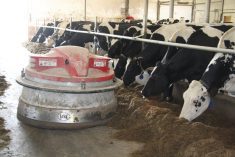Canada’s leading advocate for raw milk recently found common ground with one of the country’s leading public health experts.
Speaking before a session at the National Farmers’ Union annual convention in Saskatoon Dec. 2-4, Michael Schmidt, president of Cow Share Canada, reiterated his long-held position on raw milk.
“In the raw milk issue, we have a disaster looming if we do not bring it up out in the open so that we have a certain standard in the production of raw milk.”
Read Also

Soybean market still figuring out implications of China-U.S. pact
Soybean futures had a muted reaction to the U.S. trade deal with China as the market tries to figure out the nuances of the deal.
Schmidt, who has been the public face of raw milk in Canada since police raided his Ontario farm in 1994, argues that raw milk is safe if produced properly and that it’s time for the government to relax its rules prohibiting its sale.
“Canada is the only G-8 country with a total prohibition on raw milk.”
He said raw milk is not only legal in many European countries but is available in vending machines in schools.
He insisted that raw milk does not pose any more of a hazard than other food.
Schmidt said government prohibition encourages a black market where producers are not properly monitored and some may not do everything possible to limit the risk of disease.
Dr. Robert Buckingham, executive director of the University of Saskatchewan’s School of Public Health, had his own take on the issue.
“The process of pasteurization has been around for a long time, and has proven effective,” he said.
Buckingham told the NFU convention that science indicates that raw milk poses more of a risk of causing disease than pasteurized milk. As a result, he couldn’t endorse removing the ban.
“All we do in public health is tell the public to reduce risk factors.”
During his presentation, Schmidt agreed that drinking raw milk involves risk.
“All of life is risk,” he said after showing charts that measured levels of food-borne illness from other products.
He also said it was unfair to lump raw milk produced in operations such as his with raw milk that large-scale dairies deliver for pasteurization.
He said a truckload of milk destined for pasteurization would carry milk from multiple producers and it would take only one sloppy producer to contaminate the load.
Buckingham was unwilling to wade into the debate on raw milk’s nutritional merits. He said more research is needed to support anecdotal claims about raw milks’ perceived health benefits.














